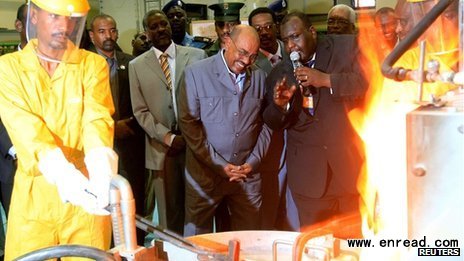| ||||||||||||||||||||||||||||||||||||||||||||||||||||||||||||||||||||||||||||||||||||||||||||||||||||||||||||||||||||||||
|
Sudan's President Omar al-Bashir has opened the country's first gold refinery1, which officials say is one of Africa's largest plants.
苏丹总统奥马尔·巴希尔开启国内第一个冶金厂,官员称这是一座非洲最大的工厂。
 The refinery has a daily production capacity of 900kg of gold and 200kg of silver Analysts2 say it is part of a strategy by the Khartoum government to deal with the loss of oil revenue following the session of South Sudan last year.
The Sudan Gold Refinery will produce more than 328 tonnes of gold each year.
Last month, the finance ministry3 said the export of gold ore from Sudan would be banned once the refinery opened.
According to the Reuters news agency, Sudan hopes to sell gold worth up to $3bn this year, double last year's gold revenue.
The country has great mining potential, but overall production figures are hard to verify because unofficial miners account for a large part of the gold industry, the agency says.
The new refinery, which will also process silver, is intended to reduce the amount of gold smuggled5 to other markets, such as Dubai, as producers should receive more money for higher-quality gold, it says.
"The refinery is the first project of its kind in Sudan and the second in Africa for producing and extracting gold and silver with high quality and purity," China's official Xinhua news agency quotes the director of the refinery, Mohamed Hassan Osman, as saying at the inauguration6.
Another refinery director, Azhari Altayeb, said the plant would also process gold from countries in the region such as Egypt, Eritrea, Chad and the Central African Republic, reports the Sudanese Media Center, a website which has close links to the government.
South Africa's Rand Refinery, which describes itself as one of the world's largest gold refineries7 - processing "most of Africa's gold", has a capacity to produce 600 tonnes of gold annually8.
South Sudan seceded9 in July 201,1 taking with it three-quarters of the former country's oil production - though it relied on pipelines10 routed through Sudan for export.
In January, a row with Sudan over oil transit11 oil prompted Juba to shut down its entire oil production of 350,000 barrels a day.
The move cut government income in Sudan, forcing Khartoum to impose spending cuts. Negotiations12 to end the dispute are ongoing13.
The BBC's James Copnall in Khartoum says Sudanese officials often state they hope gold will replace the lost oil revenues.
However economists14 say some of the revenue disappears into the black market - and it still does not make up for all the oil money.
点击  收听单词发音 收听单词发音
|
||||||||||||||||||||||||||||||||||||||||||||||||||||||||||||||||||||||||||||||||||||||||||||||||||||||||||||||||||||||||
上一篇:日本航空破产重组后再度上市 下一篇:欧盟预算协议难以达成 |
||||||||||||||||||||||||||||||||||||||||||||||||||||||||||||||||||||||||||||||||||||||||||||||||||||||||||||||||||||||||
- 发表评论
-
- 最新评论 进入详细评论页>>



